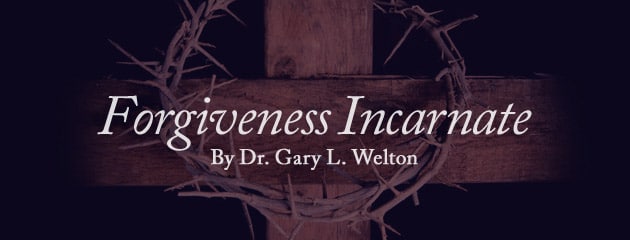
On the cross, Christ personified ultimate forgiveness. “Father, forgive them, for they know not what they do” (Luke 23:34). Christ is forgiveness incarnate.
Our responsibility to “Put on the Lord Jesus Christ” (Romans 13:14) requires us to practice forgiveness. Indeed, the failure to forgive is described by Christ in the most serious of terms. “If you forgive others their trespasses, your heavenly Father will also forgive you, but if you do not forgive others their trespasses, neither will your Father forgive your trespasses” (Matthew 6:14-15).
Hence the statement by Fyodor Dostoevsky in “The Friend of the Family.” Dostoevsky writes, “I am a Christian; I cannot refuse to forgive.”
Forgiveness may be the ultimate family therapy. In “Light from Heaven” Jan Karon writes, “Love is an act of endless forgiveness.” A marriage without forgiveness will be short.
Through forgiveness, we learn to love; through love, we learn to forgive. George MacDonald, in “The Laird’s Inheritance,” pens, “He who does not need much cannot know much, any more than he who is not forgiven much can love much.”
The resulting comfort is pervasive. For instance, in “A Parchment of Leaves” Silas House writes, “She could drift off in this peace of being forgiven.” When families function well, forgiveness is ever present and pervasive. In “Le Pere Goriot,” Honoré de Balzac writes, “We two, you know, we’re the only people in the world who’ll always love you enough to forgive you, no matter what. You see? Family feelings are the safest of all.”
Yet, it doesn’t always work the way it should in our families. George MacDonald comments upon this in “The Gentlewoman’s Choice.” He writes, “For a father not to forgive is far worse than for a son to need forgiveness.”
But then again, it goes both ways. In “The Picture of Dorian Gray,” Oscar Wilde observes, “Children begin by loving their parents; as they grow older they judge them; sometimes they forgive them.”
By definition, forgiveness is given, not taken. Although in our society we often say, “It is easier to ask for forgiveness than to ask for permission.” In fact, forgiveness is granted, not assumed. The presumption of forgiveness is never justification for our faulty treatment of others.
In “The Axe,” Sigrid Undset writes, “Now it dawned on her that, when she received God’s forgiveness, she would no longer desire to escape her punishment.” The consequences of our errors often outlive forgiveness. The anger can be relinquished, but not all consequences will disappear.
The reality of forgiveness does not eliminate the natural consequences or the need for justice. Naguib Mahfouz, in “Arabian Nights and Days,” suggests, “Justice possesses disparate methods, among them the sword and among them forgiveness. God has His own wisdom.”
Failure to recognize one’s harms and sins prevents a true forgiveness. As Anthony Trollope, in “Can You Forgive Her” penned, “I think that she may be forgiven, in that she had never brought herself to think lightly of her own fault.”
Without the divine virtue of forgiveness, we are a hopeless people. In her book “The Last Time They Met,” Anita Shreve asks, “What was left but forgiveness? Without it, she was suddenly certain, what there was of her life would be a torture, right down to the death agonies of the nursing home.”
Although Ollie Jones claimed that “Love Makes the World Go ‘Round,” you can also argue that forgiveness keeps it in balance. In “The Shack,” William Young writes, “Every time you forgive, the universe changes; every time you reach out and touch a heart or a life, the world changes.”
As we age and mature, we face the realities of pain and suffering, the consequences of sin, and the realities of the human condition. In his popular book “Presumed Innocent,” Scott Turow observes, “To go beyond our old troubles will require a treacherous journey across nearly unspannable chasms to grace and forgiveness.”
The chasm, however, is only unspannable in human terms. As Trollope again writes, “Have you no trust in God’s providence? Cannot you accept what has been done for you?”
Father, “Forgive us our debts, as we also have forgiven our debtors” (Matthew 6:12).
But Father, please don’t stop there. My forgiving of my debtors is imperfect, incomplete, and finite. Please view my imperfect forgiving of my debtors through the righteousness of Christ.
Trollope sums it up well in “Phineas Redux.” He writes, “When they take my life may He forgive my sins through the merits of my Savior.”
This Easter, and everyday forward, let’s remember that Jesus Christ is forgiveness incarnate.

